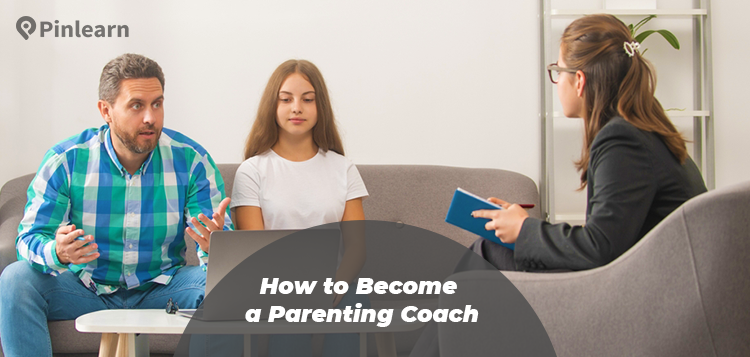How to Become a Parenting Coach: Definition, Key Steps, Techniques, Success Stories
Today, parenting is quite the same yet starkly different from earlier times. Thanks to increasing screen time, changing cultural norms and unrealistic work-life challenges! Amidst this conundrum, helicopter and lawnmower parents do exist, but they want to ensure they are parenting the right way!
Thus, parenting coaches are in demand more than ever! Even celebrity parents, such as George and Amal Clooney, Jessica Biel and Justin Timberlake are consulting parenting coaches for advice. So, definitely it’s the right moment to step in as a parenting coach!
But, how to become a parenting coach?
This blog discusses everything you need to know about parenting coaching! From parenting coaching and detailed steps to getting your first paying clients to excellent tips to find success! So, let’s buckle up to start a transformative career!
What is Parent Coaching?
Before we move on to the detailed steps to becoming a parenting coach, let’s get the basics right! So, who is a parenting coach?
A parenting coach is a dedicated professional who helps parents or primary caregivers deal with the challenges of raising children. Coaches use a mix of guidance and practical strategies to address parenting issues.
The primary goal of parent coaching is to foster a conducive environment for child development.
Parent coaches can use their experience as parents who successfully dealt with a similar situation. Additionally, being a child therapist or having a relevant background could help you become a coach.
Here are the short-term and long-term challenges parent coaching helps to navigate:
- Adjusting to your child’s behavioral challenges as they grow
- Supporting new parents to get adjusted
- Improve communication skills to strengthen your relationship with your child
- Dealing with family transition issues like divorce, death or adoption
- Managing learning challenges and disorders, such as dyslexia, ADHD or autism
- Handling substance abuse or recovery
- Conversing on sensitive topics like sex education, puberty
- Teaching life skills to your child
- Strategies to reduce mobile addiction and screen time
Why Become a Parenting Coach?
Now that you know what a parenting coach does, let’s discuss its benefits.
-
Help Parents to Navigate Through Challenges
A parenting coach helps to carve out their client’s unique parenting journey. As they sail through the challenges and celebrate their achievements, they chisel their parenting skills.
-
Flexible Schedules
Unlike a 9-5 job, you can define your own coaching schedules, set your prices and decide on the client types to hire.
-
Earn a Profitable Revenue
Parenting coach is evolving as a demanding field. If you have identified the right niche and have relevant credentials, you can earn a sizable revenue as a parenting coach.
-
Satisfaction & Fulfillment
Imagine the radiance on your client’s face on becoming a successful parent! Isn’t it priceless? Empowering other parents in their parenting journeys positively impacts their lives and is an immensely rewarding profession.
How to Become a Parenting Coach?
The coaching industry is a glitzy $5.3 billion industry, and parent coaching is its essential part. Despite its increasing significance, many aren’t aware of the potential benefits of hiring a parenting coach. Moreover, you need to get trained and gain credentials to increase your face value as a coach.
That said, let’s discuss the steps on how to become a parenting coach and carve a successful business:

Step 1: Finding Your Niche
Nou, you have made up your mind to become a parenting coach? So, what’s the first crucial step?
Figuring out your niche is your first essential stride.
Your niche is the main sail of your business, and it decides how far your business will sail through turbulent waters! Simply put, your niche helps you stand out and build authority in your domain.
For instance, if you market yourself as a parenting coach, it’s quite generic, and there might be several such coaches out there.
So, finding a niche is essential. Now, let’s see how to find one?
Rewind a bit: Is there a challenge you successfully endured as a parent? This could be dealing with your newborn’s abnormal sleep cycles or reducing screen time. Evaluate your skills, expertise, and passion; find what excites you!
Here are a few popular parenting coaching niches:
- Toddler sleep training coach
- New parent coach
- Special needs coach
- Co-parenting after divorce coach
- Teen parenting coach
- Communication coach
- Autism coach
- Nutrition coach
- Communication coach
- ADHD Coach
- Stress coach
Perform competitor analysis and identify the coaching services your competitors are offering. Lastly, don’t forget to validate if your niche is profitable enough!
Note: Use the “inch-wide and mile-deep philosophy”: Choose a niche in which you are an expert and have built a mile-deep knowledge.
Step 2: Getting Relevant Training & Certifications
The next step is to get yourself certified and reassess your background. There are no formal requirements to be a parenting coach.
But, having a relevant bachelor’s degree in child development, psychology, counseling, education, social work provides you the essential foundation!
So, do you need to be a certified parenting coach?
No, a certification isn’t mandatory. But, pursuing a certification provides you the required professional knowledge and credibility to start your coaching business.
Some of the popular parenting coaching certifications are:
| Certification Program | Course Length | Price | Accreditation |
| Parent Coach Certification Training by PCI | 1 year | $5800 | No |
| Parent Coach Certification by Jai Institute of Training | 7 months | $4500 | No |
| Parent Coaching Certificate by Concordia University | 22 credits | – | NCFR |
| Conscious Parenting Certification | 5 months | $8500 | – |
These certifications cover topics such as parenting theories and styles, emotional intelligence, conflict resolution, etc.
Step 3: Gaining Practical Experience
“The only source of knowledge is experience!” And traversing through the actual coaching world could be overwhelming! Gaining practical experience early in your career helps you to learn the ropes of trade.
Here are the different ways to gain real-world experience as a coach:
Internships & Volunteering
Volunteer at community centers, schools, or non-profit organizations and gain valuable experience. This makes you equipped to brace the real coaching challenges ahead.
Enrolling on a Practical Certification
Some coaching certifications include offering practical coaching services as a part of their curriculum. This offers hands-on experience, real insights and strategies on how parenting coaching actually works.
Free Workshops & Coaching Sessions
Host free workshops or webinars on trending topics, such as stress management, awareness of learning disorders and autism. At the end of the session, you could subtly promote your coaching services.
Reach Within Your Network
Your friends and family are your first circle of network. Identify people who would benefit from your coaching services and reach out to them. Make sure you take feedback at the end of the session.
Step 4: Establish Your Coaching Practice
Now, it’s time to get in on the action – build your coaching program!
Here is an easy 4-step process to start set your parent coaching business:
Identify Your Target Audience
First and foremost, you need to be clear about who your ideal client is. Use tools like client personas, value proposition canvases, and empathy maps. This helps to identify their demographics, pain points, challenges, goals, etc.
Use social media polls, surveys, website pop-ups, and email newsletters to gain insights. Join online communities like subreddits, Facebook groups, or Twitter to better engage with and understand them.
For instance, if you are a new parent coach, target expectant and new parents facing challenges managing newborns.
Create a Business Plan
Most businesses fail without a clear strategic business plan! Setting goals, milestones, and strategic plans are all part of the game!
Here are the key elements of your business plan:
Business model
Determine how you are going to sell your coaching services.
Choose from the following business models:
- Private or group coaching sessions
- Memberships
- Selling online courses or ebooks
Start by offering 1:1 coaching calls for 60 minutes. Later, you can offer additional services like group coaching, selling online courses, etc.
Coaching Objectives & Process
A typical coaching program include the following key aspects:
- Introductory session and initial assessment of how parents are doing
- Goal-Setting & Roadmap
- Session Plan – Objectives, Activities, Homework
- Evaluation & Progress Tracking
- Final Review & Feedback
🛎️ Note: Download our 12-week coaching template to skip the groundwork and kickstart the coaching business.
Methodology, Tools & Techniques
Develop a unique coaching style based on past experiences and effective parenting principles. Integrate coaching techniques, tools and methodologies into your program to make it effective.
| Coaching Aspect | Examples |
| Methodologies | Cognitive Behavioural Coaching(CBC), Solution-focused Brief Coaching (SFBC), Attachment Theory, EQ Coaching |
| Models | GROW Model, ABC Model, The Nurtured Heart Approach |
| Tools | Parenting Stress Index (PSI) and Parenting Style Questionnaire (PSQ), Behaviour charts and trackers, Role Playing & Simulations |
Pricing model
You can charge per session, per month (retainer), or per package (recommended 3-month package) for your coaching program.
Decide your prices based on your expertise, your value, your location, and any additional support you may provide, such as community access and resources.
For example,

Step 5: Promote Your Coaching Services
A targeted marketing strategy explaining the benefits of your parenting coaching program can win you clients!
Leverage the following promotional strategies to drive leads:
- Establish a strong social media presence on Instagram and Facebook. Share testimonials, insights and parenting tips.
- Join Facebook groups, engage in discussions, offer solutions and establish your authority.
- Create YouTube videos on prevalent parenting challenges like “managing teens”, and “nutritional tips.”
- Create your professional websites and share testimonials and resources.
- Blog and write guest posts to create awareness of positive parenting, different challenges, tips and more.
- Collaborate with local schools, psychologists, pediatricians and community centers to offer workshops and get referrals.
- Reach out to niche-related podcast channels to join as guests and share your expertise.
So, that’s pretty much on how to become a parenting coach! We know, it’s too much to take on at once; take your time!
What are the Skills for Becoming a Parenting Coach?
You can’t be an effective coach overnight; it takes time to develop mastery!
But you can certainly work on these skills and traits to improve your coaching skills.
- Exceptional Communication Skills
Communication is a key skill that great coaches possess! From goal-setting and effective questioning to non-judgemental coaching, communication is an indispensable tool in every phase.
- Parenting Knowledge & Wisdom
Your parenting wisdom is valuable and often molds your unique coaching style! As a parenting coach, ensure you have knowledge on child development stages, discipline techniques & strategies.
- Empathy
Can you resonate with your client’s feelings? Perhaps you are a deeply empathetic coach and have a heightened sense of awareness of your clients’ problems.
- Active Listening
Listen beyond your client’s words! Look into the non-verbal cues, expressions, and “aha” moments during conversations. This takes your coaching to a whole new level!
- Understanding of Family Dynamics
Family functions as a unit and plays a key role in your child’s development. So, becoming a parenting coach involves having knowledge on family needs, interactions, and shared values.
To evolve as a coach, keep yourself updated on the latest psychological and parenting trends.
How Much Can a Parenting Coach Make?
Parenting Coaching is definitely a demanding field. With around 63 million parents with children under 18 years in the U.S. alone, you have made the right decision!
So, how much can you make as a parenting coach?
According to ZipRecruiter, parenting coaches earn around $41,015 annually ($21/hour), and the top coaches make around $60,000 annually.
As per Salary.com, the average salary of parenting coaches is around $41,138 per year.
Education, certifications, expertise, and specific and additional coaching services influence the overall earnings.
Tips & Resources to Become a Successful Parenting Coach
Becoming a parenting coach is a constant quest, where each client is a lesson to learn from.
We have curated some amazing tips to become a better coach!
- Identify your strengths, skills and passions to discover your coaching niche.
- Research on diverse family dynamics, such as single-parent, blended and multicultural homes
- Share your experiences, struggles and successes to win trust and build rapport.
- Create productive sessions by outlining the goals, strategies and session plan in advance.
- Offer practical guidance and frame an actionable plan to empower parents in their pursuit.
- Build a safe space for your clients to express and feel accepted without any biases.
- Draw clear boundaries on client communications to avoid burnout and attain work-life balance.
- Seek mentorship or hire a coach to learn from their valuable experience. Join coaching communities like ICF, NPEN, etc., to stay updated on trends and seek practical advice.
Parent Coaching Resources
Here are some valuable resources for becoming parenting coach:
Books & Journals
- Parenting as a Second Language by Elisabeth Stitt
- Co-Active Coaching by Henry Kimsey-House, Karen Kimsey-House, Phillip Sandahl
- Positive Discipline by Jane Nelsen
- The Whole-Brain Child by Daniel J. Siegel & Tina Payne Bryson
- Journal of Child Psychology and Psychiatry (Parenting trends & research)
Courses
- Everyday Parenting: The ABCs of Child Rearing by Yale University. (Coursera)
- Become a Certified Parent Life Coach (Udemy)
- Certified Positive Discipline Parent Educator Program
Podcasts and Webinars
- The Joyful Courage Podcast by Casey O’Roarty
- Parenting Beyond Discipline by Erin Royer-Asrilant
- The Parenting Junkie Show
Successful Parenting Coaches to Drive Inspiration
Next, get ready to drive inspiration, gather insights and fuel ideas from these successful parenting coaches!
Shefali Tsabary
A clinical psychologist, best-selling author of three parenting books, and TED speaker, Dr.Shefali Tsabary is popular in the parenting coaching industry. Her books, “Conscious Parent” and “The Awakened Family,” are New York bestsellers. She runs the Conscious Coaching Institute, which offers coaching cohorts and certifications.
Dr. Shefali advocates integrating emotional intelligence and mindfulness and transitioning from traditional parenting towards self-awareness. Her coaching style blends Eastern philosophy and Western psychology, bringing in a more holistic parenting approach!

Leanne Page
Leanne Page is a Board-Certified Behaviour Analyst known for her coaching endeavors in parenting with ABA (Applied Behaviour Analysis). She is the author of parenting books, “Parenting with Science: Behavior Analysis Saves Mom’s Sanity” and “Enjoy Parenting: The Busy Mom’s Behavior Toolbox.”
Page applies ABA techniques and tools, emphasizing positive reinforcement and behavior management. With a master’s degree in psychology and experience as an educator, she aims to save parent’s sanity every day!

Elisabeth Stitt
Another famous personality in the parenting coaching realm, Elisabeth Stitt, swiftly transitioned from teaching to coaching realm. She is a multi-hyphenate, donning diverse roles as an author, parent educator, and hands-on mom.
Joyful Parenting Coaching is her brainchild, offering coaching programs, workshops and parenting resources. Her book, “Parenting as Second Language,” expounds on parenting techniques and provides practical insights for families.
Elisabeth’s coaching approach is based on mindful parenting, empathy, and fostering deep emotional relationships.

Are You Ready to Become a Parenting Coach?
Now, you have a complete understanding on how to become a parenting coach! As a parenting coach, you need to adopt a multi-faceted approach to understand the client’s perspective and offer effective solutions. Once you have gained experience with 1:1 coaching, scale your coaching business with group coaching, online courses, and membership sales.
So, let’s empower parents through their journey uphill!
👉 Explore our other coaching blogs:
FAQ-Related to How to Become a Parenting Coach
1. How to be a parenting coach?
To become a parenting coach, identify a niche, get certified, gather practical experience, build your coaching business and promote and scale your coaching services.
2. How to make money as a parenting coach?
As a parenting coach, you can charge per session, per month or build a coaching package to offer your services. Plus, you can earn additional income through courses, publishing coaching books, and membership platforms.
3. Do you need certification to be a parenting coach?
No, certification is not essential to being a parenting coach. However, getting certified offers the essential credentials and knowledge to start your coaching business. Parent Coaching Certification (PCI), Parenting Coaching Certification (Jai Institute), and Conscious Parenting Certification are a few credible parent coaching certifications.
4. How long does it take to be a parent coach?
There are several parenting coaching certifications, and each has varying course length. It takes around 5 months to 1 year to get certified as a parenting coach.
5. How does a parenting coach work?
Parenting coaches offer coaching through in-person or online sessions. First, they conduct an initial assessment of the client’s needs and expectations. Next, coaches consider the client’s strengths and shortfalls to set realistic goals. Finally, they evaluate the goals over time.





